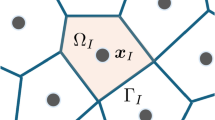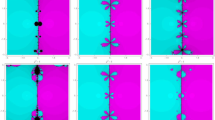Abstract
The paper considers the construction of adaptive methods based on the explicit Runge–Kutta stages. The coefficients of these methods are adjusted to the problem being solved, using component-wise estimates of the eigenvalues of the Jacobi matrix with the maximum absolute values. Such estimates can be easily obtained at the stages of the explicit method, which practically does not require additional calculations. The effect of computational errors and stiffness of the problem on the stability and accuracy of the numerical solution is studied. The analysis allows one to construct efficient explicit methods that are not inferior to implicit methods in solving many stiff problems. New nested pairs of adaptive methods are proposed, and the results of numerical experiments are presented.
Similar content being viewed by others
REFERENCES
E. Hairer and G. Wanner, Solving Ordinary Differential Equations II: Stiff and Differential-Algebraic Problems (Springer-Verlag, Berlin, 1996).
C. F. Curtiss and J. O. Hirschfelder, “Integration of stiff equations,” Proc. Nat. Acad. Sci. USA 38, 235–243 (1952).
V. I. Lebedev, “How to solve stiff systems of differential equations by explicit methods,” Computational Processes and Systems (Nauka, Moscow, 1991), Vol. 8, pp. 237–291 [in Russian].
J. G. Verwer, “Explicit Runge–Kutta methods for parabolic partial differential equations,” Appl. Numer. Math. 22 (1–3), 359–379 (1996).
E. A. Novikov, Explicit Methods for Stiff Systems (Nauka, Novosibirsk, 1997) [in Russian].
L. M. Skvortsov, “Explicit stabilized Runge–Kutta methods,” Comput. Math. Math. Phys. 51 (7), 1153–1166 (2011).
L. M. Skvortsov, Numerical Solution of Ordinary Differential and Differential-Algebraic Equations (DMK, Moscow, 2018) [in Russian].
L. M. Skvortsov, “Explicit adaptive Runge–Kutta methods for stiff and oscillation problems,” Comput. Math. Math. Phys. 51 (8), 1339–1352 (2011).
L. M. Skvortsov, “Explicit adaptive Runge–Kutta methods,” Math. Models Comput. Simul. 4, 82–91 (2012).
M. E. Fowler and R. M. Warten, “A numerical integration technique for ordinary differential equations with widely separated eigenvalues,” IBM J. Res. Dev. 11 (5), 537–543 (1967).
J. D. Lambert, “Nonlinear methods for stiff systems of ordinary differential equations,” Lect. Notes Math. 363, 75–88 (1974).
A. Wambecq, “Rational Runge–Kutta methods for solving systems of ordinary differential equations,” Computing 20 (4), 333–342 (1978).
V. V. Bobkov, “New explicit A-stable methods for the numerical solution of differential equations,” Differ. Uravn. 14 (12), 2249–2251 (1978).
A. N. Zavorin, “Application of nonlinear methods for computing transient processes in electric circuits,” Izv. Vyssh. Uchebn. Zaved. Radioelektron. 26 (3), 35–41 (1983).
L. M. Skvortsov, “Adaptive methods for numerical integration in problems of dynamical system simulation,” J. Comput. Syst. Sci. Int. 38 (4), 573–579 (1999).
L. M. Skvortsov, “Explicit adaptive methods for numerical solution of stiff systems,” Mat. Model. 12 (12), 97–107 (2000).
L. M. Skvortsov, “Explicit multistep method for the numerical solution of stiff differential equations,” Comput. Math. Math. Phys. 47 (6), 915–923 (2007).
O. S. Kozlov, L. M. Skvortsov, and V. V. Khodakovskii, Solution of Differential and Differential-Algebraic Equations with the Help of MVTU Software Package (2005). http://model.exponenta.ru/mvtu/20051121.html.
O. S. Kozlov and L. M. Skvortsov, “MVTU software package in scientific research and applied developments,” Math. Models Comput. Simul. 8 (4), 358–368 (2016).
B. A. Kartashov, E. A. Shabaev, O. S. Kozlov, and A. M. Shchekaturov, Dynamic Modeling Environment SimInTech for Technical Systems (DMK, Moscow, 2017) [in Russian].
K. Dekker and J. G. Verwer, Stability of Runge–Kutta Methods for Stiff Nonlinear Differential Equations (North-Holland, Amsterdam, 1984).
L. F. Shampine and M. W. Reichelt, “The MATLAB ODE suite,” SIAM J. Sci. Comput. 18 (1), 1–22 (1997).
P. Bogacki and L. F. Shampine, “A 3(2) pair of Runge–Kutta formulas,” Appl. Math. Lett. 2 (4), 321–325 (1989).
F. Mazzia and C. Magherini, Test Set for Initial Value Problem Solvers: Release 2.4 (Dep. Math. Univ. Bari, 2008). http://pitagora.dm.uniba.it/~testset/report/testset.pdf
Author information
Authors and Affiliations
Corresponding author
Additional information
Translated by E. Chernokozhin
Rights and permissions
About this article
Cite this article
Skvortsov, L.M. Construction and Analysis of Explicit Adaptive One-Step Methods for Solving Stiff Problems. Comput. Math. and Math. Phys. 60, 1078–1091 (2020). https://doi.org/10.1134/S0965542520070106
Received:
Revised:
Accepted:
Published:
Issue Date:
DOI: https://doi.org/10.1134/S0965542520070106




